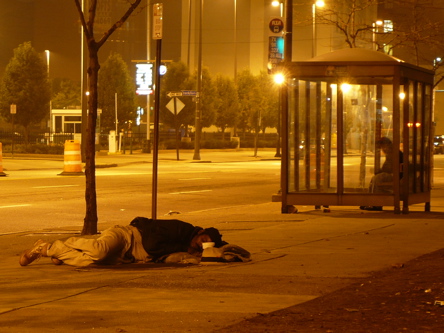Cleveland steered well clear of the "10 meanest cities" list that was part of Homes Not Handcuffs: The Criminalization of Homelessness in U.S. Cities, a new report by The National Law Center on Homelessness & Poverty and The National Coalition for the Homeless
According to the executive summary, "The report documents cities with the worst record related to criminalizing homelessness, as well as initiatives in some cities that constitute more constructive approaches to street homelessness." Cleveland is cited mostly in the latter category. For example, this appears under the heading Alternative to Food Sharing Restrictions:While many cities are imposing restrictions on groups that share food with homeless individuals in public, Cleveland has pursued a more productive approach to help homeless persons obtain food. The City of Cleveland contracted with the Northeast Ohio Coalition for the Homeless (NEOCH) to bring individuals and groups who serve food to homeless people together to talk about how to improve services. The coordination effort stemmed from a long-standing public debate related to serving food in downtown areas of the city, especially the center of downtown called Public Square.
As part of the project, NEOCH coordinates all the professional outreach teams providing services to homeless people who are living outside. NEOCH began this process by organizing monthly meetings with outreach workers. The goal was to develop one contact number so that individuals could call an outreach worker in lieu of calling law enforcement about any concerns over a homeless person in a public space.
In addition, NEOCH coordinated a disjointed food sharing system with the goal of eventually moving all the food providers indoors, but still supporting the right of groups to share food with individuals who would like to eat outside. For example, NEOCH found that on Sundays on Public Square in the center of downtown over 700 meals are served by six different groups. However, on Monday nights no groups regularly shared food on the Square. The first step was to eliminate duplication and to get every food provider to agree to a uniform set of standards on the preparation and distribution of food. The next step was to relocate the food distribution from the heavily traveled center of downtown to a parking lot 18 blocks east. This was a hardship especially for those living on the near west side of Downtown. In exchange for agreeing to the move, the food sharing groups were given access to bathrooms as well as an indoor location during bad weather.
The final step was making available an overnight indoor location in which any church can bring food or provide warm clothing or spiritual counseling. Cleveland advocates have thus far opened this indoor location only for two nights a week and only in the winter on a trial basis. In 2009, advocates hope to find the funding for a seven day a week overnight drop in center to serve those who choose not to go to shelters.
And under Trends in Addressing Panhandling:
Cleveland’s campaign will place 15 lime green and red parking meters in the city to raise money for the Downtown Cleveland Alliance's Downtown Homeless Fund. Alliance President Joe Marinucci said that the number of meters will eventually grow to 40. This program marks a partnership between the Alliance, the City of Cleveland, the faith-based community and property owners.
After noting the controversial 2005 anti-panhandling law, passed over the objections of activists, the report explains:
From 2006 to 2008, city officials, including law enforcement officers, worked with advocates to relocate homeless people who slept in sensitive locations. In 2000, the city had signed a binding legal agreement as part of a settlement monitored by a federal court to resolve a case challenging sweeps of homeless persons. In the settlement, the City agreed not to arrest or threaten to arrest anyone sleeping on the sidewalk within the City of Cleveland. In response to a fire started by a homeless person at the Convention Center, the City began working with outreach workers and advocates to relocate homeless people from the Convention Center, the airport and a tent city near Cleveland Browns Stadium. These moves were done in a cooperative manner, and many of those resistant to shelter received housing.
In case you were wondering, the "meanest" cities are:
1. Los Angeles, CA
2. St. Petersburg, FL
3. Orlando, FL
4. Atlanta, GA
5. Gainesville, FL
6. Kalamazoo, MI
7. San Francisco, CA
8. Honolulu, HI
9. Bradenton, FL
10. Berkeley, CA
— Frank Lewis


